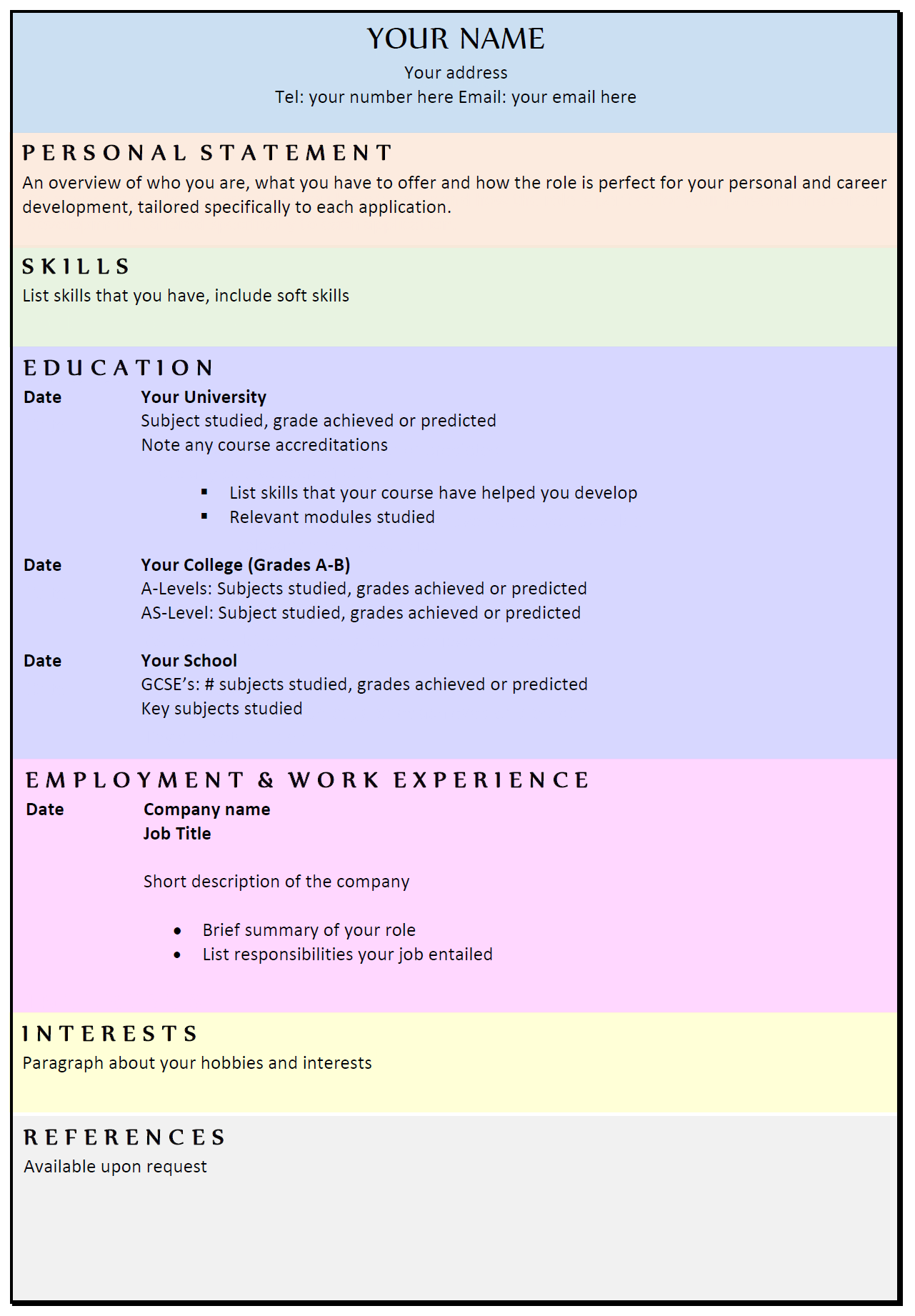Writing your first CV can feel very daunting but it isn’t something you should be apprehensive about, this is a topic that you are the leading authority on. A CV isn’t a 200 page autobiography it is a mere snap shot of who you are today and an opportunity to provide a potential employer with an insight into your story so far.
Before putting pen to paper it’s important to get the right context for what the CV is trying to achieve for you. I find the best way to look at this is to imagine yourself as the employer and what would they be looking for:
- Transferable Skills: try to think about what skills the job potentially requires and how skills and attributes you have would compliment the role. This could range from organisation to creative skills (remember to tell the truth and for them to be representative of who you are). Employers will naturally want people with wide ranging skills but at this stage of your career it’s unlikely they will expect you to perform excellently at so many, it’s more that you have the ability to learn new skills and embrace them with enthusiasm rather than resistance.
- Cultural Fit: just as you have friends that share similar interests and passions employees will be looking for people who they feel will mix well with existing staff and has the potential to enhance the team dynamic. A demonstration of your work ethic is always a good thing to get across in your CV. No one wants to employ someone that doesn’t pull their weight.
- Genuine Interest: just as you want your first job to be in something you’re passionate about so does the employer. Any link you can make with hobbies and passions that tie in with the role will undoubtedly help.
- Persistence, persistence, persistence: any job will undoubtedly have multiple applications and as such you need to separate yourself from the pack as best you can. My top tip for first jobs is to get out there and meet people face to face or if that’s not possible making a telephone call. In the digital era we live in, seeing your CV in amongst every other email can be luck of the draw. Popping in to see if there are job opportunities shows people you are serious about working and gives them an opportunity to chat to you in an informal setting. Even if the person you speak to isn’t the right person, employees are far more likely to get back to you, if the person you did speak to, speaks highly of you.

The CV itself:
- Personal Statement: as best you can you should always try and tailor this to the specific role. As such, this section of your CV will be rewritten multiple times (make sure you save each version so you have it to refer back to for a potentially similar role further down the line). The message you’re trying to convey in your personal statement is:
- Who you are:
- What you have to offer
- How this role is perfect for your personal and career development
It’s important to give specific examples as being too generic will not separate you from the pack and quite often have the reader discounting your CV without reading any further.
- Skills: this section is a good opportunity for the younger applicant (i.e. one whose education section may be slim because they are quite simply too young to have done their A-Levels) to expand on areas such as their IT Skills (name programmes you’re proficient in) or First Aid qualified. You can also include soft skills: good negotiator, friendly, work well under pressure.
- Education: typically the starting point for this section would be your GCSE results but depending on your age this may be predicted or mock grades. There should be no expansion on this section just factual information (i.e. not an opportunity to explain why you did poorly on a test). This section should be written in reverse-chronological order (i.e. newest information at the top).
- Hobbies and Interests: there can be a tendency to want to exaggerate or pad this section out, to try and portray a more well-rounded character that ticks all the boxes. Try not to. This portion of your CV is almost always discussed at the interview. The interviewer will use this section as an opportunity and topic to relax you and to get an insight into your personality. Therefore, if you’ve exaggerated something you did once years ago, and they ask you about it, you’ve potentially lost a great opportunity to talk in a passionate free flowing manner and are instead stuttering, sweating and hoping they’re not an expert on something you know little about. You may think a hobby or interest is obscure but remember we’re all different and listening to someone talk enthusiastically will show the interviewer how they can benefit from your enthusiasm.
- Employment History: if you have had any previous work experience put it here and provide a very brief summary on your role. If there are no previous examples to pull from then this can be left out, but it’s worth thinking about any examples you’ve got i.e. running a cake stand for the school charity, answering the phone at a relatives workplace during the school holidays, etc.
- References: simply put available upon request on this item but make sure you have spoken to who you have in mind so that they are aware that their details could be provided. Teachers, family friends, and previous employers are good initial places to start.
- Style / Design: There are many different CV formats out there and I think this is your opportunity to develop something which reflects you. Make sure the information is clearly set out, easy to follow and no longer than 2 pages. If the job you’re applying for is more creative then there’s a perfect opportunity to be more creative with your CV.
You’ll find an example CV structured below, each element of a CV we have discussed above is defined by a coloured section. You don’t need to write it all at once, choose a section and work on that, when you are happy, move on to another, etc. Then when you have completed each section piece them all together to form your first CV. (Note, the colours are just a guide to break up and simplify the various sections, and not something you should incorporate into your CV).

Some of you will be lucky and find a job relatively quickly, others may be unlucky and not find their match for a while. Much like the jobs themselves, CV’s and interviews are experiences you will learn from, so stay positive and keep searching for your opportunity. There is a fit for you out there and the next chapter is waiting to be written.

